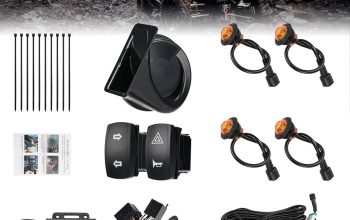A bad wheel bearing sounds like a continuous grinding or rumbling noise while the vehicle is in motion. Wheel bearings that are worn out or damaged often produce a grinding or rumbling noise when the vehicle is in motion.
This noise can increase with vehicle speed and may be more noticeable when making turns. It is important to address this issue promptly as a bad wheel bearing can lead to serious damage and potentially unsafe driving conditions. By recognizing the distinctive sound of a bad wheel bearing, you can save yourself from potential problems and ensure the safety and reliability of your vehicle.
Credit: www.youcanic.com
Signs Of A Bad Wheel Bearing
A bad wheel bearing can produce various distinct sounds, indicating a potential issue with your vehicle. These noises can serve as telltale signs of a bad wheel bearing. When driving, you might hear a grinding, growling, or humming noise, particularly when turning or accelerating.
These strange noises can intensify as the bearing worsens. Another sign could be vibrations felt in the steering wheel or floorboards, especially at higher speeds. Additionally, an uneven wear pattern on your tires might suggest a problem with the wheel bearing.
If you notice any of these signs, it is crucial to address the issue promptly to ensure your safety and prevent further damage to your vehicle.
Strange Noises Indicating A Bad Wheel Bearing
A bad wheel bearing can be identified by strange noises coming from your vehicle. These noises include a grinding or growling sound, which typically indicates a damaged wheel bearing. Another noise to listen for is a humming or whirring noise, which also suggests a problem with the wheel bearing.
Additionally, a clicking or snapping noise may occur when the bearing is severely damaged or completely worn out. It’s important to pay attention to these sounds as they can be a warning sign of a potentially dangerous situation. If you hear any of these noises, it’s crucial to have your wheel bearings inspected and repaired by a professional mechanic to avoid further damage to your vehicle and ensure your safety on the road.
Vibrations At Higher Speeds As A Sign Of Bad Wheel Bearing
Vibrations at higher speeds could indicate a bad wheel bearing. The first sign you might notice is steering wheel vibrations. These vibrations can be felt in your hands as you turn the wheel. Another indication of a bad wheel bearing is floorboard vibrations.
You may feel these vibrations through the pedals or even the seats. These vibrations can become more pronounced as you accelerate or turn. If you experience these symptoms, it’s important to have your wheel bearings checked by a professional. Ignoring the issue could lead to more serious problems and potentially dangerous driving conditions.
Regular maintenance and inspection of your wheel bearings can help ensure a smooth and safe driving experience. So, if you notice vibrations at higher speeds, it’s best to get it checked out sooner rather than later.
Uneven Tire Wear Linked To Bad Wheel Bearing
A bad wheel bearing can cause uneven tire wear, which is evident through wear on one side of the tire. Another sign to look for is feathering or cupping on the tires. These issues occur due to the wheel bearing allowing excessive play in the wheel hub assembly, causing the tire to wear unevenly.
When the bearing is damaged or worn out, it may produce a variety of sounds. These sounds can include a humming, grinding, or growling noise coming from the wheels. The noise may increase in intensity as the vehicle accelerates or when turning.
It’s essential to address the problem promptly to prevent further damage to the wheel bearing and ensure safe driving conditions. Regular maintenance and inspections can help identify and address any wheel bearing issues before they escalate.
Frequently Asked Questions Of What Does A Bad Wheel Bearing Sound Like
What Does A Wheel Bearing Sound Like When It’S Going Bad?
A bad wheel bearing can make a grinding, humming, or rumbling noise when it’s going bad.
Is It Ok To Drive With A Noisy Wheel Bearing?
Driving with a noisy wheel bearing is not safe. Get it fixed promptly to avoid further damage or accidents.
What Happens If A Wheel Bearing Fails While Driving?
A failed wheel bearing while driving can cause the wheel to wobble or seize, potentially leading to loss of control and accidents.
How Long Can You Drive On A Bad Wheel Bearing?
A bad wheel bearing can make your car unsafe to drive, so it’s best to get it fixed immediately.
Conclusion
Overall, it is crucial to pay close attention to the sounds your vehicle makes, as they can indicate potential issues with the wheel bearings. Identifying and addressing a bad wheel bearing early on can save you from expensive repairs and ensure your safety on the road.
Whether it’s a humming, growling, or grinding noise, any abnormal sounds should be promptly investigated by a trusted mechanic. Remember, wheel bearings play a critical role in the functioning of your vehicle’s wheels, and ignoring the warning signs can lead to more serious problems in the long run.
So, if you notice any unusual sounds coming from your wheels, don’t delay in getting them checked out. By being proactive and addressing any wheel bearing issues promptly, you’ll be able to enjoy a smoother and safer driving experience for miles to come.
